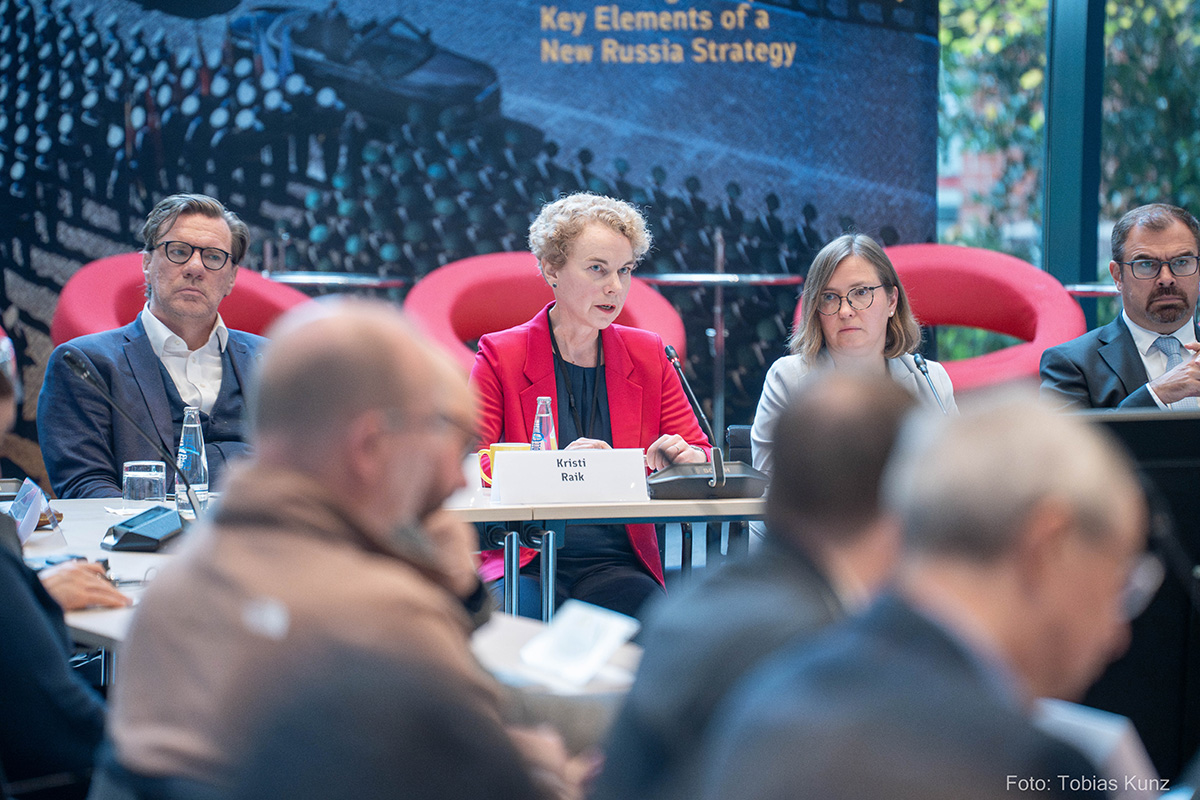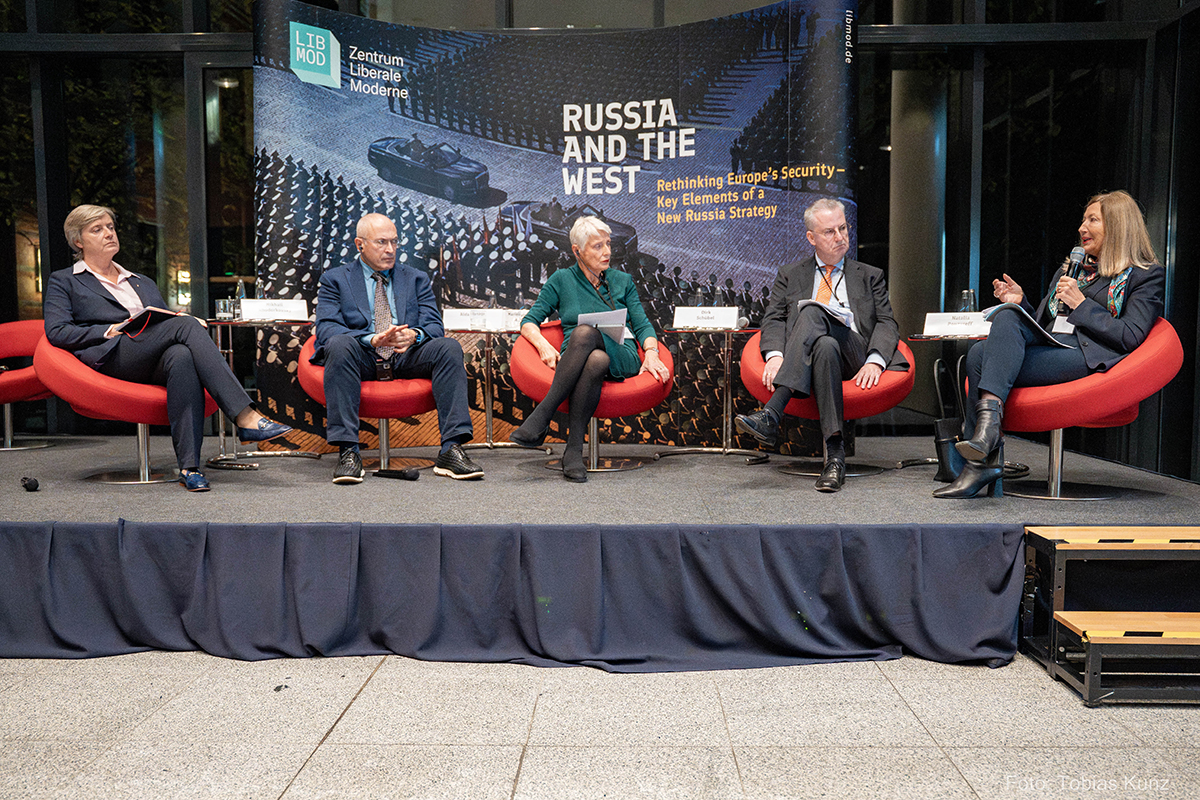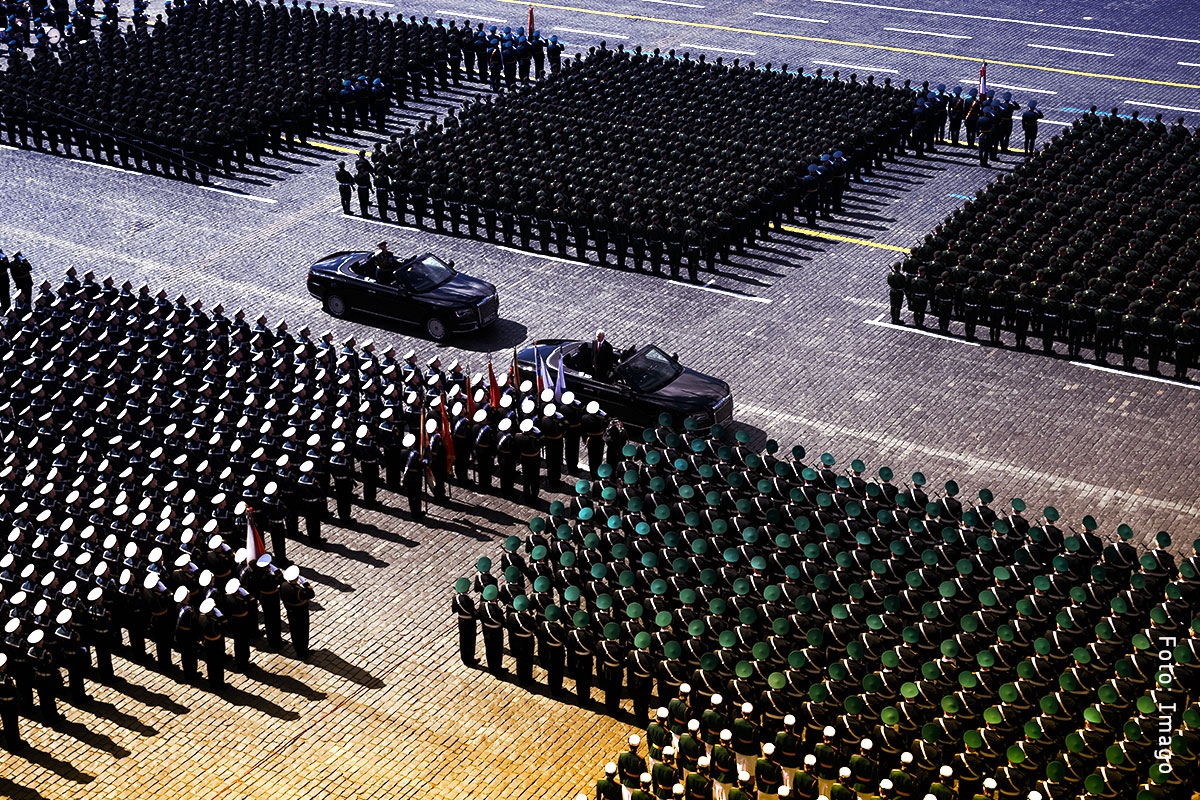Conference Report: Russia is Gearing up for a Long War. Are we Ready?

While Russia is preparing for a long war, the West remains hesitant and divided. At this year’s conference Russia and the West, participants urgently called for a new European policy versus Moscow. They pleaded for a double strategy to enable Ukraine to win the war and to support democratic change in Russia.
As Russia’s all-out war against Ukraine is in its third year, the results of Germany’s “Zeitenwende” are mixed: Vladimir Putin’s military successes have been limited, while Ukraine – surprisingly for many – has asserted itself militarily with Western help. However, the country is paying a high price for this. Given the brutality of the war and the consequences of a Ukrainian defeat for the European order, support from the West remains too little too late. Western governments disagree about how far their support for Ukraine should go and there is a lack of clarity about how to deal strategically with Russia and the shape of a post-war European order.
Against this dramatic backdrop, almost 100 experts discussed about future Western Russia policies at the Center of Liberal Modernity’s “Russia and the West” conference, this year under the headline “What is at Stake”.
We interviewed conference participant and former deputy US ambassador to Germany Robin Quinville on the sidelines of the conference.
The Kremlin is creating conditions for a long war
The panel on Russia’s domestic situation agreed that Putin is both preparing for a long war and is using the war to consolidate his regime. The composition of the newly-formed government after Putin’s “re-election” for another six-year-term in March 2024 shows that the regime is mobilising economic resources in order to fight a long war.
For this, the Kremlin can rely on sufficient popular support. Only a minority of Russians dissent and occasionally openly show this under great risk – for example by gathering to mourn Alexei Navalny or by public support for presidential candidates Boris Nadezhdin and Ekaterina Duntsova, who advocated a limited anti-war agenda before being barred from standing in the election.
A majority continues to support the regime and its war against Ukraine. However, this majority is highly atomized and intimidated, prompting doubts about how active its support is. There certainly is no big enthusiasm for joining the military: The defence ministry had to raise soldiers’ pay levels five times in the last two years.
And because the recruitment drive targets low-income and socially disadvantaged groups in order to avoid general mobilisation, the war causes a redistribution of wealth towards these groups: And as more people benefit from it economically, the proportion of those who feel that the distribution of wealth in Russia is fair is rising for the first time since the 1990s, according to surveys.
The regime can also rely on widespread anti-Western sentiment. After the large-scale invasion of Ukraine was initially presented as a “special military operation” on the periphery, it is increasingly being portrayed as a new edition of the Great Patriotic War, in which Russia must assert itself against the West.
Such messages resound also with Russians otherwise critical of the government, because they offer simple explanations and moral relief even for those who feel that their country is waging an unjust war. In addition, many who principally disapprove of the war believe that once it has started, Russia must avoid defeat.
Is Putin overconfident or desperate?
However, participants disagreed whether the replacement of Putin’s long-time confidante Sergei Shoigu by the economist Andrei Belousov as defence minister in the middle of the war was a sign of strength or desperation.
Some argued that by installing a defence minister without military experience, Putin demonstrated that he is confident to take important military decisions alone, while Belousov is expected to improve the efficiency of defence spending. “Putin thinks that he is winning. A war of attrition is won by economics,” one panelist said.
But others argued that Belousov’s appointment and the simultaneous arrests of high-ranking Defence Ministry officials on corruption charges signals desperation. “These arrests and Shoigu’s removal are clear signs that Putin believes that things are very bad and that he is resorting to desperate countermeasures,” another panelist said.
However, everyone agreed that Russia, which already spends more than eight per cent of its GDP on defence and national security, has sufficient resources to continue the war in the short term. The Russian economy, boosted by increased military production, could also cope with the consequences of the sanctions in the short term thanks to high revenues from oil sales.
In the medium and long term, however, the problems will worsen. Glaring labour shortages and a lack of Western technologies are already making themselves felt. The pivot towards China, intended i.a. to replace important gas revenues like from Germany and the EU, is not working as planned. Beijing is exploiting Moscow’s dependence on natural resource exports to force lower prices.
Rising military spending is also expected to force cuts in social spending. This in turn could exacerbate social tensions due to ethnic, regional, social or ecological injustices. And the elites themselves could also be affected.
The sum of these internal factors, exacerbated by the sanctions, will increase tensions in the system in the long term. In the foreseeable future, however, only a Russian defeat in Ukraine could pave the way for change.
Sanctions need resolve
The discussion about the West’s sanctions policy was markedly less controversial. Practically everybody agreed that all measures against Russia’s war economy must be tightened or improved. The West can and must act here because it is significantly stronger: the EU member states are forecast to have a joint GDP of 19 trillion US dollars in 2024, almost ten times as much as Russia’s two trillion.
But while the balance of resources favors the West, the balance of resolve favors Moscow. Thus, panelists urged to close loopholes for goods like machine tools and semiconductors going to Russia via third countries and for profitable exports from Russia, first and foremost oil. While the discussion about the former led to calls for a blanket trade ban that would end the current exemptions for medical goods and food, hopes for the latter focus on an embargo for Russian liquefied natural gas (LNG) and on bans for Russian oil tankers in EU ports.
Most speakers also urged to give the 200 billion dollars of Russian Central Bank assets frozen in Europe to Ukraine – and not just the interest income. Because, once the money is frozen, it may legally be taken, as the lawyer Patrick Heinemann explained in an article for our dossier on sanctions. Turning to those in the German government and the European Central Bank who reject this as “too risky”, one panelist asked why the delivery of weapons to Ukraine was less risky.
Our panelist, former Ukrainian government official Olena Tregub offered a short summary of the debate on sanctions.
Elements of a new European Russia policy
However, the West is currently finding it difficult to mobilize the necessary resources for a Ukrainian victory. Several participants saw one reason for this in the fact that the West lacks a strategy for dealing with Russia. During the discussion, they warned that any arrangement with the current regime necessarily means giving concessions to the Kremlin at the expense of Ukraine.
Instead, the West should be working towards victory for Ukraine and provide the country with everything it needs to achieve this. At the same time, we should permanently minimise the Kremlin’s capacity for aggression through a combination of military deterrence and containment. The conference agreed that the Putin regime is the main obstacle to sustainable peace in Europe and for democratic reforms in Russia.
Panelists pointed out that Putin openly sees the war against Ukraine as part of a long conflict to weaken the West and undermine the rules-based liberal order, which in his eyes is Western supremacy. And Russia is not acting alone, but in an alliance with Iran and China. For this reason, a Kremlin victory would have catastrophic consequences for the future international order. That is why the West, if it wants to succeed, needs both a strategy for victory and reconstruction in Ukraine and a long-term strategy to transform Russia and not just to weaken the Kremlin. Even if it does not seem likely at present, every opportunity should be used to achieve changes in Russia.
Possible elements of such a strategy:
- Force the Kremlin into international isolation.
- Significantly increase the sanctions’ economic pressure.
- Hold Moscow accountable for its war crimes in Ukraine – inter alia by resuming the initiative for a special tribunal on the crime of aggression.
- Work on stabilizing the countries in the EU’s eastern neighbourhood.
- Promote the prospects for a post-imperial Russia. Cooperation is possible only if Russia ceases to pose a threat to its neighbours and if it respects international law. Today, this means above all supporting the democratic opposition, civil society and the free media, which embody the hope for a different Russia.
Foremost, however, the West needs to support Ukraine with everything it needs for a victory. And regardless of the outcome of the US election, there needs to be a fairer burden sharing between Europe and the US.
Editing by Nikolaus von Twickel
![]()
Did you like this article? If yes, you can support the independent editorial work and journalism of LibMod via a simple donation tool.
Donate via PayPal
![]()
We are recognized as a non-profit organization, accordingly donations are tax deductible. For a donation receipt (necessary for an amount over 200 EUR), please send your address data to finanzen@libmod.de
Related topics

























